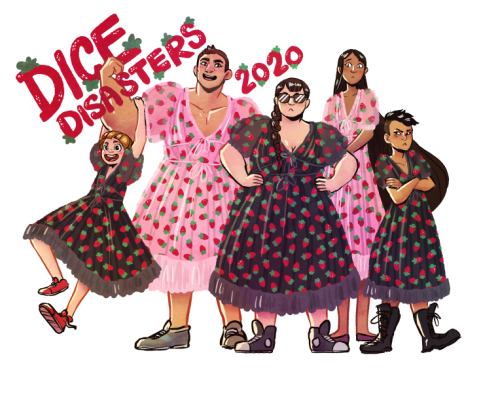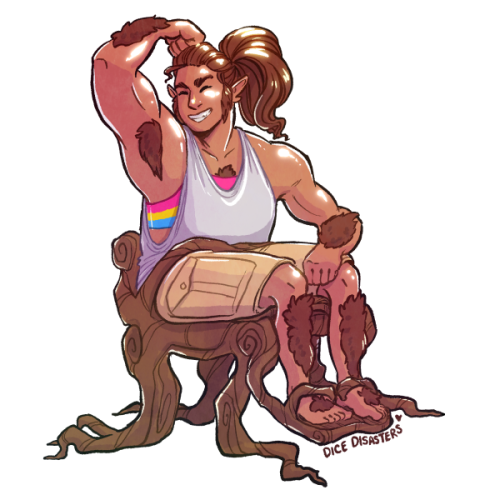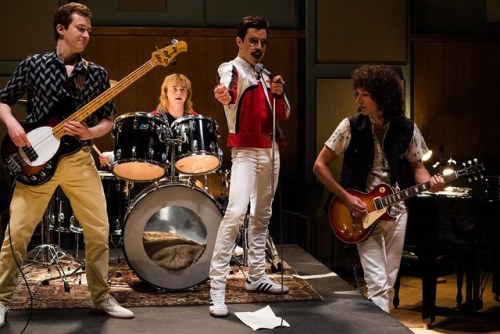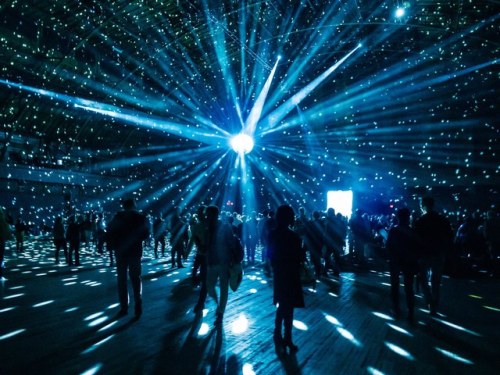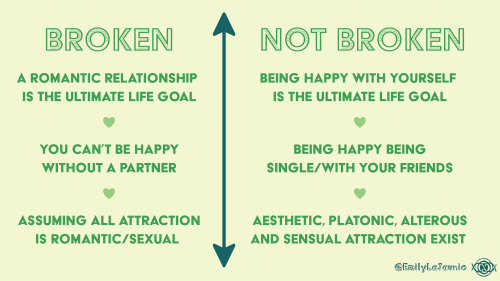#queer representation
We’re a little late to the Stawberry Dress party, but like, fashionably late B)
art by @allofthenorth
Post link
Daughter Scruff (she/her)! Trains up our heroes and pats them on the head when they fail very badly and lie face down on the floor.
More art from the indomitable @allofthenorth
Post link
Bohemian Rhapsody’s Queer Representation Is Downright Dangerous
Bohemian Rhapsody opens with Queen’s 1976 hit “Somebody to Love,” unsubtly blazoning Freddie Mercury’s quest for companionship as its central dilemma, alongside the meteoric rise of the band that made him an icon. “Can anybody find me somebody to love?” Freddie (played by Rami Malek) pleads as the camera pans over his shoulder in a flash-forward to the Live Aid performance that crystalized Queen’s place among the world’s greatest rockers.
The frontman biopic, in theaters November 2, far from ignores the singer’s alleged bisexuality, as feared it might when the first trailer was released this spring. (While Mercury was known to have relationships with both men and women, he strongly resisted commenting publicly on his private life.) But director Bryan Singer’s characterization of Mercury’s sexuality has little, if anything, to do with sex. In fact, there is not a single sex scene in the film’s drawn-out runtime — a startling omission given Mercury’s storied sexual appetite, and even despite the movie’s PG-13 rating. (Plus, this is supposed to be about rock ’n’ roll, remember?)
Rather,Rhapsody seizes on its protagonist’s sexuality as the root of a dual and destructive nature; a pivot around which to construct its narrative of competing, and ultimately irreconcilable, desires. Singer casts Mercury’s psychosexual imagination as a tug-of-war between convention and perversion, love and lust, security and dissolution. Such representation isn’t just cliche and dangerously reductive in its vilification of homosexual desire and implicit invalidation of bisexual identity. It also renders a flesh-and-blood pioneer of genderqueer glam rock with a richly erotic psyche as a hollow and false totem of the perils of fame.
Any film about a queer celebrity, set even in the recent past, has an obligation to contextualize how a star’s queerness was expressed and received during less tolerant times. But it’s not Bohemian Rhapsody’s historical context that demonizes Mercury’s same-sex attraction — it’s the camera itself.
Mercury’s conservative Parsi-Indian background and the rock scene’s heteronormative fan appeal were doubly stacked against him. But Bohemian Rhapsody is only mildly concerned with potential fallout from mom and dad (played by Meneka Das and Ace Bhatti) — stereotypes of South Asian immigrant parents if I’ve ever seen them. They wring their hands when their son abandons his birth name, Farrokh Bulsara, to fully adopt his stage moniker. Mr. Bulsara is briefly shown reading tabloid headlines about his son’s backroom dalliances with men, and keeping the paper from Freddie’s mother. A resolutory scene that finds them quietly accepting Jim Hutton (Aaron McCusker), who would go on to be Mercury’s lifelong partner, as a “friend” Freddie brings home for tea is so pat as to feel absurd.
Post link
I’m Autistic and Sick of Feeling Excluded from Queer Spaces
I’m alone at The Abbey, a queer bar in West Hollywood, hiding in the bathroom. I’m hyperventilating, plugging my ears, frantically tapping on all my iPhone apps to calm myself down and pass the time. My friends aren’t here yet, so I don’t dare go back to the bar, where there’s loud music, harsh air conditioning, flashing lights, overlapping conversations, people brushing up against me, and the risk of having drinks spilled on me. This is an autistic nightmare. At worst, I will feel awkward, alone, in pain, and physically ill as a result of tonight’s outing; perhaps so nauseous from the sensory input that I cannot drive home. At best, I might dissociate completely, ceasing to register my body, my pain, and my needs.
Tonight is my friend Zara’s coming out party, and I want to be there for her. I vow to try my best. My friends finally arrive, and we claim our private, roped-off section of the dance floor. Drinks are circulating. Everyone around me is dancing and having a great time. I want to ask a bartender for water, but only after I’m certain that no one is waiting to order before me. At last, I see an opening. I blurt out the phrase I have been rehearsing in my head for the past ten minutes: “Excuse me, can I just have a plain glass of water?” I perform a head tilt and furrow my brow — something I’ve noticed other people do when asking for things. Rehearsing phrases is something I’ve done since I was little, to avoid saying the wrong thing, embarrassing myself, or giving the wrong impression when left to my own communication devices. Many friendly inflections and gestures don’t come naturally to me. Tonight, I succeed. The bartender delivers my water swiftly.
As a human being in this world, I need the following things: good friends, genuine connections, comfort and safety, pride, community. As a queer person, I need queer comrades, as well as safety and comfort in my queer community. In attempts to get these needs met, I force myself through scenarios like Zara’s coming out party. Unfortunately, as a queer autistic person, it is shockingly rare to encounter queer (and non-queer) spaces that are accessible and that feel welcoming.
Many queer spaces, events, and practices do not welcome autistic people. These spaces may not explicitly aim to exclude us, but they are not designed or planned with people like me, who have sensory sensitivities, an intense need for structure, and atypical social behaviors, in mind. Crowded parties, nightclubs, protests, and parades trigger sensory overload, something that happens whenever my senses are overstimulated by the environment. Seemingly small details, like cold weather, smoke, coconut scent, or unexpected splashes of water can be a deal breaker in regards to whether or not I can withstand being in a particular place.
Moreover, social gatherings can be unpredictable and vague. It is rare that I consider attending something if I don’t have ample details and a schedule in advance, which causes me to miss out on seeing lots of friends, going to concerts, and dating. I have to put up massive facades to make it through most events, or risk enduring painful comments on my overly formal conversation style, my pickiness, and stolid face. An overstimulating event — like a party at a bar — can leave me feeling hungover and sick for days.
This lack of awareness and accommodation for the autistic community — even among other marginalized people like in LGBTQ+ spaces — is a result of ableism: discrimination and prejudice against disabled people. Whether deliberate or accidental, ableism is harmful, as it sends the implicit message that disabled people are not welcome. Ableism gets in the way of my access to the queer community and in turn makes me less proud to be part of that community. While I feel comfortable in autistic spaces, I do not always feel visible and affirmed as a queer, nonbinary person. I am always dividing myself into fractions in order to be socially accepted; I can never show up as my full queer, autistic self.
Post link
So many good queer representation in TV shows nowadays… But nothing can fill that abysmal void left by the tragic love story of a blue-eyes angel and the most caring man on earth.
Post 2: Aromantics Aren’t Broken
There’s nothing wrong with not wanting a romantic partner. Having a life partner isn’t required to be happy or to have a fulfilling life. What other’s assume will make you happy may only make you miserable. Do what makes you happy and comfortable.
Happy Aromantic Spectrum Awareness Week 2021
Each day I’ll be posting something to spread awareness and positivity about aros!
Post 1: It’s a Spectrum; Post 3: What Not To Say to Aros; Post 4: Aros Are Awesome; Post 5: What Is My Aromantic Label?; Post 6 (Final Post): Have Pride!
[ID: There is a vertical two-headed arrow splitting the image into two sections. Both sections have a title with three statements underneath it; statements are separated by a small heart in the middle. The smaller section on the left is titled “Broken”. First statement is “A romantic relationship is the ultimate life goal”. Second is “You can’t be happy without a partner.” Third is “Assuming all attraction is romantic/sexual.” The larger right section is titled “Not Broken”. First statement is “Being happy with yourself is the ultimate life goal.” Second is “Being happy being single/with your friends.” Third is “Aesthetic, Platonic, Alterous and Sensual Attraction exist.” End Description.]
Post link

I know some of my followers like vampires… so I thought I’d show a little teaser of my contribution for the LGBTQ vamp zine Blood & Breath! Proceeds from the zine are going to the Move To Higher Ground project for the Quileute tribe. Preorders close Jan 5th and you can order a copyhere!
The way we as adults are turning to lgbtq+ content in children aimed shows because we were not offered much representation as a child just shows how important is to have in it media. There are a bunch of 20-30 something year olds watching she-ra and the owl house to heal our inner children and I think that beautiful

Head empty, only blorbos from my show
I really CAN NOT believe ofmd had the BALLS to go THERE. They really said GAY RIGHTS

